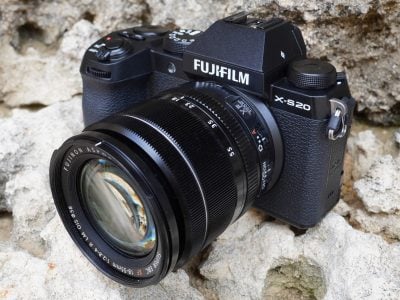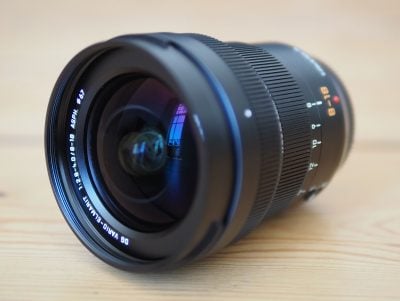Leica DG 8-18mm f2.8-4 review
-
-
Written by Gordon Laing
Quality
Leica 8-18mm vs Olympus 7-14mm vs Lumix 7-14mm at wide-end
To test the quality of the Leica DG 8-18mm, I shot the following scene with it at three focal lengths and using all aperture settings. I then repeated the process with the Olympus 7-14mm f2.8 PRO and Lumix G 7-14mm f4 zooms for comparison. All images were shot using a Panasonic Lumix GX8 body in RAW and the files processed using Adobe Camera RAW with 50 / 0.5 / 36 / 10 sharpening, zero noise reduction and all lens corrections disabled; note the camera itself may be performing corrections at a lower level which can’t be disabled, but my approach was to try and evaluate the optics as much as possible.
My first test was with all three lenses set to their widest focal lengths. As always I’ve cropped an area in the far corner and from the centre for comparison at different apertures, and marked these regions on the full image below with red squares. Since the coverage of each lens varies at their widest settings, I could either crop the same subject at different parts of the actual frame, or slightly different subjects from the exact same part of the frame; since I’m trying to evaluate their optical performance here, I’ve gone for the latter which is why, in this first test, you’ll see different details in the corner crops from each lens. Try to look beyond this to the actual resolved details and artefacts. Keep scrolling for the crops, followed by further tests at 12mm and finally at their respective longest focal lengths.
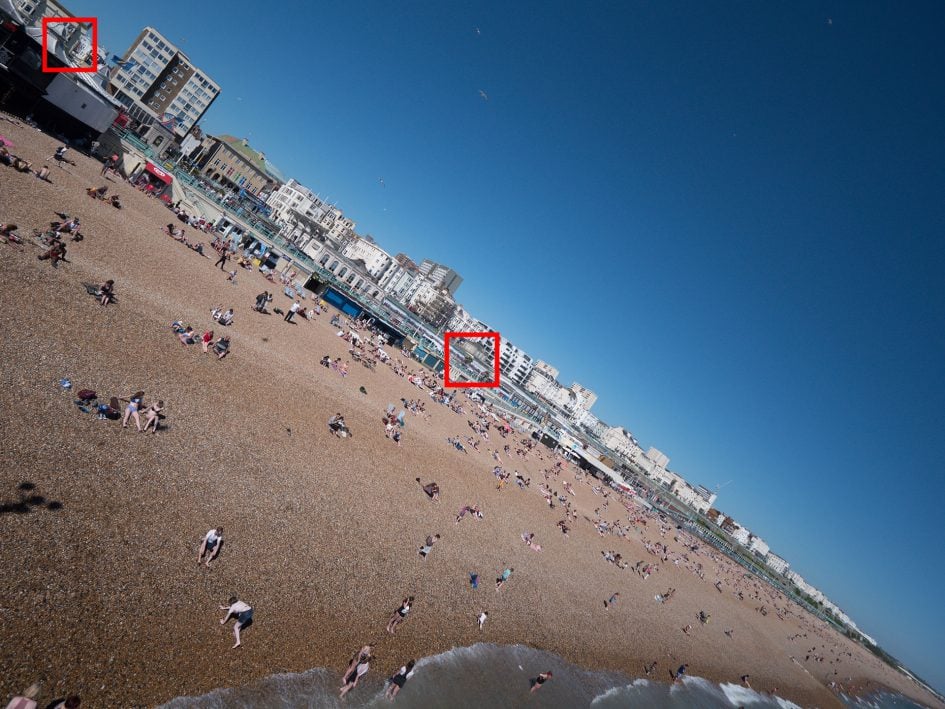
The Leica 8-18mm and Olympus 7-14mm can both shoot at f2.8 at their widest focal lengths, so the comparison starts with these two lenses alone. I’d say at f2.8 they share roughly similar quality in their far corners: a little soft, but quite usable, improved at f4 and arguably peaking at f5.6. I’d rank the Lumix 7-14mm similarly when it joins the comparison at f4, although with lens corrections turned-off, it does exhibit a little chromatic aberration that’s not apparent on the others. Meanwhile in the centre of the images, all three lenses are performing very well as you’d hope, arguably reaching peaking sharpness at f4, although still looking good at f5.6. As with most Micro four Thirds lenses, the sensor size means softening due to diffraction begins to kick-in at f8 to a small extent, but by f11 the quality has deteriorated significantly. It’s even worse at f16 and f22, so avoid these apertures at all costs unless you’re after the maximum diffraction spike effect. Keep scrolling beyond the crops for my comparisons at 12mm and then at their longest focal lengths.

Above left: Leica 8-18mm at 8mm, middle: Olympus 7-14mm at 7mm. All 100% crops from corner at f2.8.

Above left: Leica 8-18mm at 8mm, middle: Olympus 7-14mm at 7mm, right: Lumix 7-14mm at 7mm. All 100% crops from corner at f4

Above left: Leica 8-18mm at 8mm, middle: Olympus 7-14mm at 7mm, right: Lumix 7-14mm at 7mm. All 100% crops from corner at f5.6.

Above left: Leica 8-18mm at 8mm, middle: Olympus 7-14mm at 7mm, right: Lumix 7-14mm at 7mm. All 100% crops from corner at f8.

Above left: Leica 8-18mm at 8mm, middle: Olympus 7-14mm at 7mm, right: Lumix 7-14mm at 7mm. All 100% crops from corner at f11.

Above left: Leica 8-18mm at 8mm, middle: Olympus 7-14mm at 7mm. All 100% crops from centre at f2.8.

Above left: Leica 8-18mm at 8mm, middle: Olympus 7-14mm at 7mm, right: Lumix 7-14mm at 7mm. All 100% crops from centre at f4.

Above left: Leica 8-18mm at 8mm, middle: Olympus 7-14mm at 7mm, right: Lumix 7-14mm at 7mm. All 100% crops from centre at f5.6.

Above left: Leica 8-18mm at 8mm, middle: Olympus 7-14mm at 7mm, right: Lumix 7-14mm at 7mm. All 100% crops from centre at f8.

Above left: Leica 8-18mm at 8mm, middle: Olympus 7-14mm at 7mm, right: Lumix 7-14mm at 7mm. All 100% crops from centre at f11.
Leica 8-18mm vs Olympus 7-14mm vs Lumix 7-14mm at 12mm
My second test was with all three lenses set to their 12mm, carefully matching their field-of-view; I realise this is towards the long-end of the two 7-14mm zooms, but represents an almost mid-way point on the Leica. As always I’ve cropped an area in the far corner and from the centre for comparison at different apertures, and marked these regions on the full image below with red squares. Keep scrolling for the crops, followed by further tests at their respective longest focal lengths,
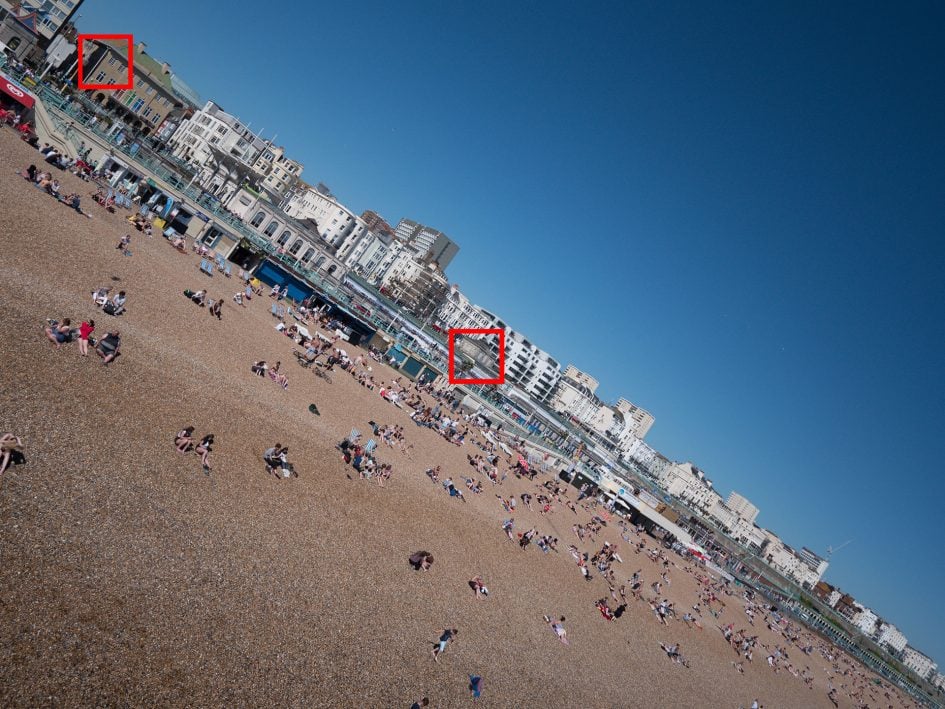
The comparison here again starts with the Leica 8-18mm and the Olympus 7-14mm, although at 12mm the Leica’s maximum aperture has closed to f3.4, giving the Olympus an advantage of half a stop at f2.8. I’d also say the Olympus is sharper in the far corner here at its maximum aperture than the Leica and while closing the apertures narrows the gap, the Olympus remains a little ahead. When the Lumix 7-14mm joins in again at f4, I’d say it roughly matches the output from the Leica 8-18mm, leaving the Olympus 7-14mm to enjoy a minor lead in the corners. Meanwhile in the centre I’d say there’s little to tell the three lenses apart, although again with the ability to maintain sharpness at a brighter maximum aperture, the Olympus again enjoys a win here. Keep scrolling for my final comparison at their longest focal lengths.

Above left: Leica 8-18mm at f3.4, middle: Olympus 7-14mm at f2.8. All 100% crops from corner at 12mm.

Above left: Leica 8-18mm, middle: Olympus 7-14mm, right: Lumix 7-14mm. All 100% crops from corner at 12mm f4.

Above left: Leica 8-18mm, middle: Olympus 7-14mm, right: Lumix 7-14mm. All 100% crops from corner at 12mm f5.6.

Above left: Leica 8-18mm, middle: Olympus 7-14mm, right: Lumix 7-14mm. All 100% crops from corner at 12mm f8.

Above left: Leica 8-18mm, middle: Olympus 7-14mm, right: Lumix 7-14mm. All 100% crops from corner at 12mm f11.

Above left: Leica 8-18mm at f3.4, middle: Olympus 7-14mm at f2.8. All 100% crops from centre at 12mm.

Above left: Leica 8-18mm, middle: Olympus 7-14mm, right: Lumix 7-14mm. All 100% crops from centre at 12mm f4.

Above left: Leica 8-18mm, middle: Olympus 7-14mm, right: Lumix 7-14mm. All 100% crops from centre at 12mm f5.6.

Above left: Leica 8-18mm, middle: Olympus 7-14mm, right: Lumix 7-14mm. All 100% crops from centre at 12mm f8.

Above left: Leica 8-18mm, middle: Olympus 7-14mm, right: Lumix 7-14mm. All 100% crops from centre at 12mm f11.
Leica 8-18mm vs Olympus 7-14mm vs Lumix 7-14mm at long-end
My third and final comparison was with all three lenses set to their longest focal lengths: 18mm on the Leica and 14mm for the Olympus and Lumix. As always I’ve cropped an area in the far corner and from the centre for comparison at different apertures, and marked these regions on the full image below with red squares. Since the coverage of each lens varies at their longest focal lengths, I could either crop the same subject at different parts of the actual frame, or slightly different subjects from the exact same part of the frame; since I’m trying to evaluate their optical performance here, I’ve gone for the latter which is why, in this third test, you’ll see different details in the corner crops from each lens. Try to look beyond this to the actual resolved details and artefacts. Keep scrolling for the crops.
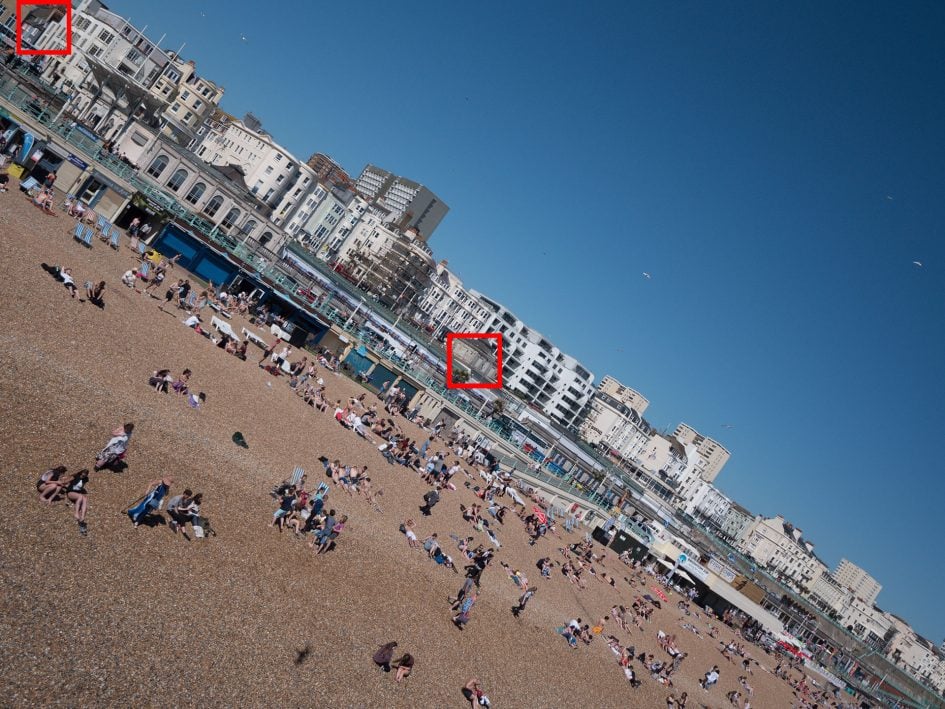
With each lens zoomed to its longest focal length, only the Olympus can muster an f2.8 aperture, with which it delivers a corner crop that’s only a little soft. At f4 the other pair join the comparison, although the Leica corner crop looks soft and the Lumix one is exhibiting some fringing, vignetting and softness; the Olympus, closed one stop to f4, looks much better here. The Leica and Lumix lenses improve when closed to f5.6, although beyond f8 diffraction softening has kicked-in. Meanwhile in the centre, all three lenses perform well at the largest apertures, including the Olympus with its own stop advantage at this point.
So in conclusion I’d rank the Olympus 7-14mm f2.8 first in resolving power and least artefacts, followed by the Leica 8-18mm, then the Lumix 7-14mm last. To put it in perspective, none of them are bad and it’s worth mentioning when the extreme corners look a tad soft, they improve greatly only just a little further into the frame, or with the aperture closed a stop.
Next check out my sample images, my in-depth review or my final verdict!

Above middle: Olympus 7-14mm at 14mm. 100% crop from corner at f2.8.

Above left: Leica 8-18mm at 18mm, middle: Olympus 7-14mm at 14mm, right: Lumix 7-14mm at 14mm. All 100% crops from corner at f4.

Above left: Leica 8-18mm at 18mm, middle: Olympus 7-14mm at 14mm, right: Lumix 7-14mm at 14mm. All 100% crops from corner at f5.6.

Above left: Leica 8-18mm at 18mm, middle: Olympus 7-14mm at 14mm, right: Lumix 7-14mm at 14mm. All 100% crops from corner at f8.

Above left: Leica 8-18mm at 18mm, middle: Olympus 7-14mm at 14mm, right: Lumix 7-14mm at 14mm. All 100% crops from corner at f11.

Above middle: Olympus 7-14mm at 14mm. 100% crop from centre at f2.8.

Above left: Leica 8-18mm at 18mm, middle: Olympus 7-14mm at 14mm, right: Lumix 7-14mm at 14mm. All 100% crops from centre at f4.

Above left: Leica 8-18mm at 18mm, middle: Olympus 7-14mm at 14mm, right: Lumix 7-14mm at 14mm. All 100% crops from centre at f5.6.

Above left: Leica 8-18mm at 18mm, middle: Olympus 7-14mm at 14mm, right: Lumix 7-14mm at 14mm. All 100% crops from centre at f8.

Above left: Leica 8-18mm at 18mm, middle: Olympus 7-14mm at 14mm, right: Lumix 7-14mm at 14mm. All 100% crops from centre at f11.
Check prices on the Leica DG 8-18mm f2.8-4 at Amazon, B&H, Adorama, or Wex. Alternatively get yourself a copy of my In Camera book or treat me to a coffee! Thanks!


